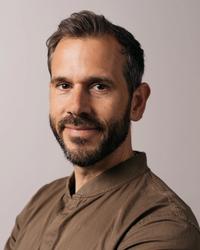Yossi Quint’s Ark Biotech Will Manufacture Meat of the Future, at Scale
Despite meat’s environmental and moral failings, humans can’t seem to quit it. That’s why Primary is backing infrastructure to grow meat in bioreactors at scale.

Global demand for meat has grown 100% over the past 30 years, and we consume 325 million metric tons of meat a year. The ramifications of our meat consumption are devastating to the climate and the welfare of animals. In one or two generations from now, humans may look back on meat consumption with disbelief, asking: how could our parents and grandparents have continued with such destructive and unethical behavior?
Cultivated meat, real animal protein biologically and chemically identical to meat but grown in a bioreactor, offers an alternative. Cultivated meat completely avoids the slaughter of animals while also offering the real meat we all know and love. The potential environmental and ethical impacts of this technology are astounding, and it’s not a pipe dream. This is the stuff of science fiction, but it’s coming, and probably sooner than you think.
Demand for protein substitutes is already proven out. The plant protein market eclipsed $10B in 2020 and will grow over 50% in the next five years. Beyond Meat and Impossible Foods, the two most successful plant-based protein brands, are valued at ~$4B and ~$7B, respectively.
The big barrier in getting to a future in which cultivated meat is widely accessible, similar to Beyond or Impossible, is not consumer demand or science, but cost and equipment. Many companies are reaching an inflection point at which the science to produce cultivated meat products will be good enough, but they’ll have no way to produce at scale. Enter Ark and one of the great infrastructure buildout opportunities of our generation.
The size of this infrastructure problem is unimaginably large. The key piece of infrastructure required to produce cultivated meat at scale is a bioreactor, essentially a large steel tank that mixes a bunch of stuff together to grow the meat. Pharma is the only other industry that uses bioreactors for large-scale production, but even if we were to convert every single bioreactor in use for pharma today into a cultivated meat bioreactor, a year’s production would only be enough to satisfy one day of U.S. meat consumption.
Additionally, for every $1 of cultivated meat sold, brands will need to spend roughly $2 in infrastructure buildout. The opportunity to build the “picks and shovels” for cultivated meat production is huge because arriving at a world in which we consume cultivated meat at scale is fundamentally not a science problem. It’s an infrastructure problem, and less obviously, a software problem. Ark has an opportunity to not only meet the equipment needs of cultivated meat companies, but also engineer better software for this equipment that analyzes data from the production process and learns how to make small adjustments in real-time.
The meat industry today is industrialized, inhumane, and massive beyond control. However, it did not always look this way. In the 19th century, farm-to-table was the default, until the introduction of the refrigerated railcar, which enabled the industrialization of meat. One technological breakthrough catalyzed the growth of a trillion dollar industry.
Yossi Quint’s Ark Biotech will be the 21st century version of the refrigerated railcar. What that invention did for traditional protein, Ark will do for cultivated meat. Ark will power the most important infrastructure buildout of this generation, creating a path to meaningfully improve the future outlook of our planet and the ethics of our species. Yossi is assembling a team of engineers, scientists, and industry leaders to build the infrastructure needed for this all-important industry.
The business opportunity is only half the story. Yossi is the perfect person to lead this business. A long-time vegan, animal welfare advocate, and industry thought leader, Yossi is uniquely equipped with the skills, network, and intrinsic passion to execute on this audacious mission. He’s an intellectual powerhouse who was a leader in McKinsey’s alternative proteins practice, co-authored its white paper on cultivated meat, and is one of the most well-networked people in this industry. This is his life’s work, and we are thrilled to partner with him as he builds.

